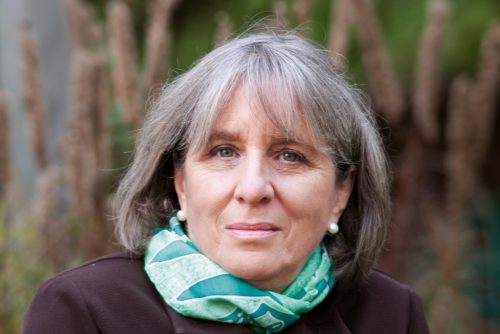By Mike Mastromatteo | Catholic News Service
Excluding New York-based writer Mary Gordon from a consideration of Catholic influence on fiction would be much more than an oversight. It would almost be a case of deliberate censorship.
Author of 13 novels, novellas and short story collections, Gordon grew up at Holy Name of Mary Parish in Valley Stream, New York. Her latest novel, “Payback,” was released in September to positive reviews.
In her youth, she attended Mass regularly and came to appreciate liturgy, parables and Gospel accounts as fodder for good storytelling. However, as an adult, Gordon grew disenchanted with Catholic orthodoxy, particularly with respect to the role of women in the church.
Nonetheless, she was labeled a Catholic writer in 1978 after the release of her first novel, “Final Payments.” Gordon says she is more comfortable described as a writer who happens to be Catholic. “I have much more in common with writers who aren’t Catholic,” she said. “For example, Virginia Woolf, a staunch nonbeliever, has been my most important influence.”

The Catholic writer tag was applied again with Gordon’s second novel, the “The Company of Women,” in 1980.
This latter work, detailing the experiences of three women drawn to the pastoral counseling of a conservative priest, drew attention to one of Gordon’s long-standing themes, namely that women need not form their identity from the church nor from their “traditional” roles as mothers, wives and nurturers.
An excerpt from “The Company of Women” is telling. It outlines the protagonist Felicitas’ inner turmoil on discovering an unexpected pregnancy: “She was going to have a baby and she could not name its father. … She was no longer herself: She was a pregnant woman. All the hard, skeletal edges of her personality, all the training that had made her mind a vessel that shone gold and silver, all the struggles of her character, all her concerns for history and for the shocking time she lived in disappeared …”
A native New Yorker, Gordon graduated from Barnard College in 1971 and recently announced her retirement after more than 30 years teaching English literature there. In addition to her fiction, Gordon has written three memoirs: a biography of St. Joan of Arc, essays on the letters of Trappist monk and writer Thomas Merton, and “Reading Jesus: A Writer’s Encounter with the Gospels.”
It’s here that Gordon interprets the Gospels as a misunderstood form of storytelling. Gordan says the inspiration for the book comes “from the sense that Jesus had been hijacked by the religious right. In particular, evangelicals of all Christian denominations have politicized and twisted the Gospels, but almost no one has come to terms with Jesus’ contradictions and paradoxes.”
Much of the author’s speculations from her literary examination of the Gospels appear frequently in her novels and short stories. In particular, St. Matthew’s passage about Christ’s admission that the poor will always be with us is a recurring theme in much of her fiction. What is so special about this for Mary Gordon?
“It is very important to me as an artist that Jesus was casting his lot with beauty and pleasure, with extravagant displays of love and beauty,” Gordon told Catholic News Service, “and dealing with the paradox that possibly these resources could be used for the poor — which was poor Judas’ point — the impossible paradox, the impossible conflict between pleasure, beauty, and the unending spectacle of the poor and needy. I love Jesus for rubbing our noses in the impossible.”
Most of Gordon’s protagonists are females who came of age in the 1960s and who struggle against powerful cultural, social and religious constraints. The characters also exhibit growing self-awareness as traditional faith and wisdom come into conflict with reason, maturity, suffering and the hard realities of contemporary society.
In the novel “Pearl,” Gordon offers to the reader Maria, a late middle-aged mother struggling to rescue her daughter from a near-fatal but practically meaningless act of civil disobedience: “Obedience was something she (Maria) gave up when she left the world of the Catholic Church for the secular universe. Now it’s a skill she must reemploy. … She doesn’t believe in anything on the other side of prayer, but she believes in the language of the poem, the potential of language for transformation, the forcing of the miraculous, the comprehension of all that seems to be incomprehensible, a place of rest at last.”
Gordon is often asked what keeps her wedded to the church. “It’s the sense that it is irreplaceable, that I can’t find a substitute for being in places with people I would never be in places with, saying words that people have been saying for thousands of years,” she said. “I could bail at any moment. … But Pope Francis gives me great hope.
“I like being on his team, particularly when I see who is against him,” she added.
Despite questioning many church stances, Gordon has a great sense of wonder about the Catholic faith. “I would say that the most important thing about Catholicism for me is that it asks the large questions and faces them in large terms,” she said. “The liturgy gives me an organic connection to those who have said the prayers in the past, (and) a window into Western culture because of the lives of the saints and the familiarity with Scripture.”
With retirement looming, Gordon’s plans include learning Spanish, tutoring released prison inmates to obtain their high school diplomas, and spending time in Wisconsin with a daughter, son-in-law and “adored grandsons.” Gordon now considers an ecumenical Benedictine monastery in Madison, Wisconsin, “as close as I can get to a parish.”
She is also considering a fourth memoir, plus another nonfiction book, “What Kind of Catholic Are You?” This latter work will feature a debate between conservatives and liberals, both arguing their views are fully supported by their understanding of Catholicism.
Mastromatteo is a writer and editor in Toronto.






















